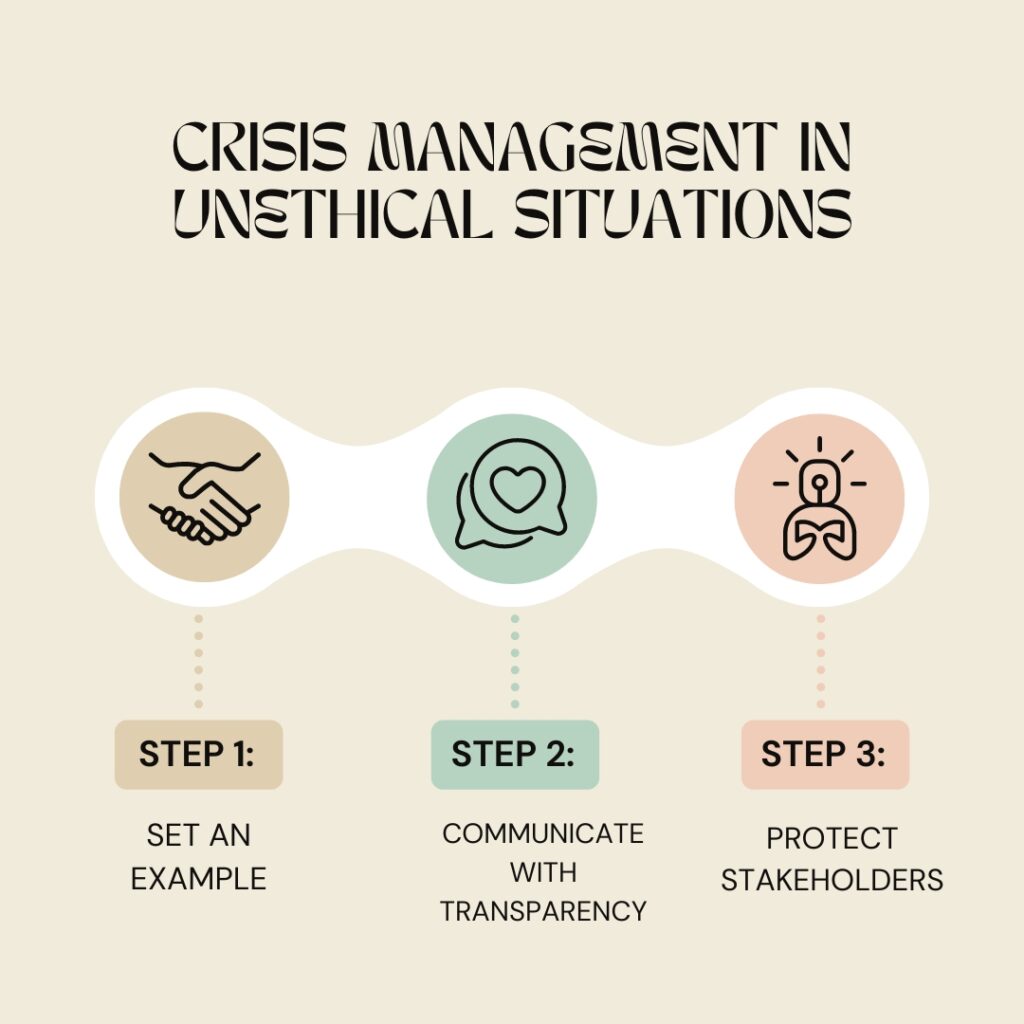
Why ethics is important in business is a billion-dollar question. From corporate scams to loss of employee trust, ethics and integrity play an important role in creating the image of an organization. Public perception of ethical organizations is much better than relatively unethical companies, thereby enhancing their overall value proposition. Millions of Ethics in business is the application of ethical principles and values to business behavior. These principles and values include honesty, integrity, fairness, and respect for the law, as well as for the rights and interests of stakeholders, such as customers, employees, and the community.
The importance of ethics in business cannot be overstated. Not only do ethical practices contribute to the overall well-being of society, but they also have a direct impact on the success and sustainability of a business.
Here are some key reasons why ethics is important in business:
Ethics important in business: Reason 1: Building trust with stakeholders
Ethical behavior is essential for building trust with stakeholders, including customers, employees, shareholders, suppliers, and the community. When a business behaves ethically, it demonstrates its commitment to doing what is right and acting in the best interests of all stakeholders. This can lead to increased loyalty, satisfaction, and support from these stakeholders, which can ultimately lead to better business outcomes.
A study by the Ethics Resource Center found that companies with strong ethical cultures had significantly lower rates of misconduct than those with weaker ethical cultures. The study also found that companies with strong ethical cultures had higher levels of employee engagement, customer satisfaction, and shareholder value.
https://www.ethics.org/global-business-ethics-survey/
Ethics Important In Business: Reason 2: Enhancing reputation
A strong ethical reputation is a valuable asset for any business. Consumers, investors, and employees are more likely to do business with and work for a company that is known for its ethical practices. On the other hand, a company that engages in unethical behavior is likely to suffer damage to its reputation, which can lead to lost business and a decline in shareholder value.
Ethics Important In Business Reason 3: Complying with laws and regulations
Ethical behavior helps businesses comply with laws and regulations, which can protect them from legal consequences and damage to their reputation. In addition, ethical practices can help a business avoid the negative consequences of unethical behavior, such as fines, legal action, and loss of market share.
Ethics Important In Business: Reason 4: Enhancing reputation and promoting long-term success
Ethical behavior is essential for building a sustainable business that can thrive in the long term. Unethical practices can lead to short-term gains, but they can also create long-term risks and problems that can undermine a business’s success. By contrast, ethical practices can lead to increased efficiency, innovation, and customer satisfaction, which can contribute to a company’s long-term success.
A survey conducted by the Reputation Institute found that consumers are more likely to purchase from and recommend companies that have strong ethical reputations. In addition, the survey found that companies with strong ethical reputations tend to have higher stock prices and stronger financial performance.
https://www.reptrak.com/blog/2022-pharma-report/
Ethics Important In Business Reason 5: Creating a positive work environment
Creating a positive work environment: Ethical behavior helps create a positive work environment in which employees feel valued and supported. This can lead to increased motivation, productivity, and job satisfaction, which can ultimately lead to better business outcomes.
Ethics Important In Business Reason 6: Improving employee behavior
Improving employee behavior: Ethical practices can help improve employee behavior by setting clear expectations and creating a culture of integrity. This can lead to increased accountability and trust among employees, which can enhance teamwork and collaboration.
Ethics Important In Business Reason 7: Facilitating employee growth
Ethical behavior can also facilitate employee growth by creating a positive work environment that encourages learning and development. When employees feel supported and valued, they are more likely to be motivated to learn and grow within the company. This can lead to increased retention and productivity, as well as better business outcomes.
In addition, ethical practices can help businesses attract and retain top talent. Many job seekers are attracted to companies that prioritize ethics and are more likely to stay with a company that values integrity and fairness.
Overall, ethics is an essential part of any business and has a direct impact on employee behavior, growth, and retention. By prioritizing ethics, businesses can create a positive work environment that promotes learning, development, and long-term success.
A study by the Global Business Ethics Survey found that companies with strong ethical cultures have lower levels of turnover, higher levels of employee satisfaction, and better financial performance than those with weaker ethical cultures.
Ethics Important In Business Reason 8: Prevent Criminal Offenses of Omission:
Ethics in business can also help prevent criminal offenses of omission, which occur when a person or company fails to act when they have a legal obligation to do so. For example, a company may have a legal obligation to report fraudulent activity within the organization, but if they fail to do so, they could be committing a criminal offense of omission.
By prioritizing ethics, businesses can create a culture of integrity that promotes transparency and honesty. This can help prevent criminal offenses of omission by encouraging employees to report wrongdoing and by ensuring that the company takes appropriate action when such incidents are reported.
Ethics Important In Business Reason 9: Easier compliance with laws and regulations
In addition, ethical practices can help businesses comply with laws and regulations, which can prevent criminal offenses of omission. For example, if a company fails to follow safety regulations, it could be putting its employees and customers at risk and could potentially face legal consequences for its failure to act. By adhering to ethical principles and following the law, businesses can help prevent criminal offenses of omission and protect themselves from legal consequences.
Overall, ethics in business is essential for preventing criminal offenses of omission and for promoting compliance with laws and regulations. By prioritizing ethics, businesses can create a culture of integrity and build trust with stakeholders, which can ultimately lead to better business outcomes.
Ethics Important In Business Reason 10: Identify and manage values associated with quality management, strategy, human resources, and diversity:
In the context of quality management, ethical practices can help businesses identify and prioritize the values that are important for delivering high-quality products and services. This may include values such as customer satisfaction, continuous improvement, and excellence. By adhering to these values, businesses can create a culture of quality that is focused on meeting the needs and expectations of customers.
In the context of strategic management, ethics can help businesses identify and prioritize the values that are important for achieving their long-term goals and objectives. This may include values such as innovation, sustainability, and social responsibility. By aligning their strategies with these values, businesses can create a culture of innovation and sustainability that is focused on creating value for all stakeholders.
In the context of diversity management, ethics can help businesses identify and prioritize the values that are important for creating a diverse and inclusive work environment. This may include values such as equality, respect, and fairness. By adhering to these values, businesses can create a culture of diversity and inclusion that is focused on creating opportunities for all employees to succeed.
Overall, business ethics can help identify and manage the values that are important for quality management, strategic management, and diversity management. By prioritizing ethics, businesses can create a culture of integrity and build trust with stakeholders, which can ultimately lead to better business outcomes.
A case study of the Volkswagen emissions scandal illustrates the importance of ethical behavior in the automotive industry. Volkswagen was found to have cheated on emissions tests, leading to significant fines and damage to the company’s reputation. The scandal also led to the resignation of the company’s CEO and other top executives.
https://www.simplimba.com/business-ethics-a-comprehensive-guide/

Ethics Important In Business Reason 11: Building a strong public image:
Business ethics is essential for building a strong and positive public image of an organization. When a business behaves ethically, it demonstrates its commitment to doing what is right and acting in the best interests of all stakeholders. This can lead to increased loyalty, satisfaction, and support from stakeholders, which can ultimately lead to better business outcomes.
A strong ethical reputation is a valuable asset for any business. Consumers, investors, and employees are more likely to do business with and work for a company that is known for its ethical practices. On the other hand, a company that engages in unethical behavior is likely to suffer damage to its reputation, which can lead to lost business and a decline in shareholder value.
Ethics Important In Business Reason 12: Improves organization culture:
Business ethics is an important factor in strengthening organizational culture. An organizational culture that values ethics and integrity can create a positive and productive work environment that is focused on doing what is right and acting in the best interests of all stakeholders.
Ethical practices can help create a culture of transparency, honesty, and fairness that promotes trust and respect among employees. This can lead to increased accountability, teamwork, and collaboration, which can ultimately contribute to better business outcomes.
In addition, ethical practices can help businesses comply with laws and regulations, which can create a culture of compliance and legal responsibility. This can help protect the company from legal consequences and damage to its reputation.
Ethics Important In Business Reason 13: Manage Societal responsibilities:
Business ethics is important for improving society in several ways. First, ethical practices can help establish government agencies, unions, laws, and regulations that are focused on protecting the rights and interests of all stakeholders. For example, ethical business practices can help ensure that companies are complying with laws and regulations related to worker safety, environmental protection, and consumer protection.
Second, ethical practices can help businesses contribute to the overall well-being of society by promoting social responsibility and sustainability. For example, businesses that prioritize ethical practices may be more likely to engage in philanthropic activities and support initiatives that benefit the community.
Ethics Important In Business Reason 14: Better Crisis Management
Business ethics is important for helping an organization maintain ethical values during times of crisis. In times of crisis, it can be tempting for businesses to prioritize short-term goals and profits over ethical considerations. However, maintaining ethical values during a crisis is essential for building and preserving trust with stakeholders, as well as for protecting the long-term sustainability and success of the organization.
There are several ways in which business ethics can help an organization maintain ethical values during times of crisis:
- Setting a positive example: By behaving ethically during a crisis, an organization can set a positive example for others to follow. This can help maintain trust and confidence in the organization and demonstrate its commitment to doing what is right.
- Protecting stakeholders: By prioritizing the interests of stakeholders during a crisis, an organization can help protect the well-being of its customers, employees, and the community. This can help maintain trust and loyalty from stakeholders and preserve the long-term sustainability of the organization.
- Communicating transparently: By being transparent and honest in its communication during a crisis, an organization can help maintain trust with stakeholders and demonstrate its commitment to ethical values.
- Making ethical decisions: By considering the ethical implications of its decisions during a crisis, an organization can help ensure that it is acting in the best interests of all stakeholders and protecting its long-term sustainability.

Overall, business ethics is an essential part of maintaining ethical values during times of crisis. By prioritizing ethics, an organization can set a positive example, protect stakeholders, communicate transparently, and make ethical decisions, which can ultimately help preserve its long-term sustainability and success.
Ethics Important In Business Reason 15: Benchmark for Employee behavior:
Business ethics can help employees behave according to the ethical values that are preferred by the top management of an organization. By setting clear expectations and creating a culture of integrity, businesses can encourage employees to adhere to ethical values and standards of behavior.
There are several ways in which businesses can promote ethical behavior among employees:
- Establishing a code of ethics: A code of ethics is a set of principles and values that guide the behavior of an organization and its employees. By establishing a code of ethics and communicating it to employees, a business can set clear expectations for ethical behavior.
- Providing ethical training: Ethical training can help employees understand the ethical values and standards of behavior that are expected of them within the organization. This can include training on topics such as honesty, integrity, fairness, and respect for the law and the rights of others.
- Leading by example: Top management can set a positive example for ethical behavior by demonstrating integrity and ethical values in their own actions. This can help create a culture of ethics within the organization and encourage employees to follow suit.
- Encouraging reporting of ethical concerns: By encouraging employees to report ethical concerns and taking appropriate action when such concerns are raised, a business can demonstrate its commitment to ethical values and create a culture of transparency and accountability.
Overall, business ethics is an important factor in promoting ethical behavior among employees. By establishing a code of ethics, providing ethical training, leading by example, and encouraging the reporting of ethical concerns, businesses can encourage employees to behave according to the ethical values preferred by the organization.
Ethics Important In Business Reason 16: Ethics as a legal instrument:
It is true that ethics and the law often intersect, and in many cases, ethical practices are required by law. For example, laws and regulations related to worker safety, environmental protection, and consumer protection are often based on ethical principles and values, such as the obligation to protect the well-being of others.
In addition, many businesses have codes of ethics or conduct that outline the ethical values and standards of behavior expected of employees. These codes may be based on industry standards, professional codes of ethics, or the values of the organization itself. In some cases, violations of these codes of ethics may be grounds for legal action or other consequences.
Overall, ethics and the law are closely related, and in many cases, ethical practices are required by law. By adhering to ethical principles and following the law, businesses can protect themselves from legal consequences and damage to their reputation and can demonstrate their commitment to doing what is right and acting in the best interests of all stakeholders.
A case study of the Enron scandal demonstrates the consequences of unethical business practices. Enron, once a highly successful energy company, engaged in a range of unethical practices, including hiding debt and manipulating financial statements. The company’s unethical behavior ultimately led to its collapse and the loss of billions of dollars for investors and employees.
https://www.simplimba.com/business-ethics-a-comprehensive-guide/

Finally, ethical practices can help businesses build trust with stakeholders, which can ultimately contribute to the overall stability and prosperity of society. When businesses behave ethically, they demonstrate their commitment to doing what is right and acting in the best interests of all stakeholders. This can lead to increased loyalty, satisfaction, and support from stakeholders, which can ultimately contribute to the overall well-being of society.
Overall, business ethics is an important factor in improving society. By prioritizing ethics, businesses can establish government agencies, unions, laws, and regulations that protect the rights and interests of all stakeholders, contribute to the overall well-being of society, and build trust with stakeholders. There should be no question of why ethics is important in business. It is the source of survival for any business.
Samrat is a Delhi-based MBA from the Indian Institute of Management. He is a Strategy, AI, and Marketing Enthusiast and passionately writes about core and emerging topics in Management studies. Reach out to his LinkedIn for a discussion or follow his Quora Page
